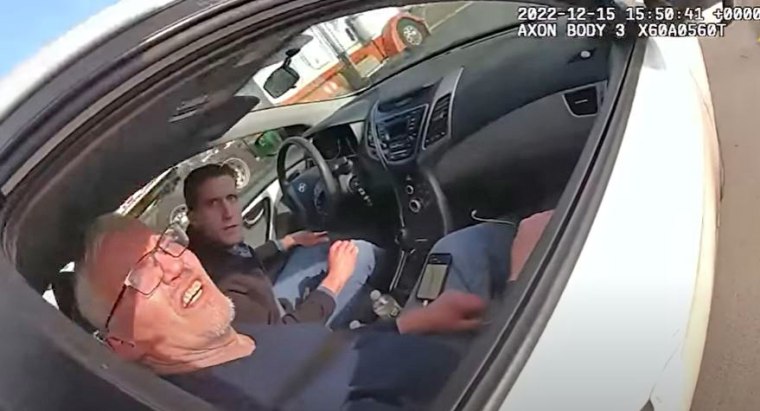In the early hours of Nov. 13, 2022, when four University of Idaho students would be stabbed to death in an off-campus house as some of them slept, a neighbor’s home security video captured the same white car circling the block multiple times. The vehicle approached the house again and again before speeding away 13 minutes later.
The previously unseen footage obtained by “Dateline” offers another angle into the turbulent events at the time prosecutors believe the students were murdered.
Photos and digital materials are included in a two-hour special airing Friday, tracing suspect Bryan Kohberger’s movements and online habits before and after the killings that stunned the small community of Moscow, Idaho.
Read more on this story at NBCNews.com and watch “Dateline” at 9 p.m. ET/8 p.m. CT Friday or check local listings.
Investigators referred to a white Hyundai Elantra, believed to be from 2011 to 2013, as a critical clue as they solicited the public’s help in finding a suspect.
It also remains one of several key pieces of evidence, including DNA and cellphone data, that prosecutors say ties Kohberger to the crime scene. Kohberger drove a white 2015 Elantra.
Cellphone tower data and phone records also obtained by “Dateline” indicate that an FBI cellphone expert said Kohberger’s phone connected to a cell tower providing coverage within 100 meters of the rental house at 1122 King Road. It connected 23 visits over a four-month period, all after dark. One visit was just six days before the killings.

Meanwhile, phone data from Kohberger’s phone and in the possession of law enforcement include internet searches in the weeks before and after the killings on serial killer Ted Bundy and searches for pornography with the words “forced,” “passed out,” “drugged,” and “sleeping.”
Kohberger, who at the time was a graduate student in criminology at nearby Washington State University, was eventually arrested in late December 2022 while he was back at his family’s home in Pennsylvania.
A judge entered a not guilty plea on his behalf in May 2023 on four counts of first-degree murder and one count of burglary.
Defense lawyers have said Kohberger maintains his innocence. During a court hearing in Boise last month, they teased the possibility of an “alternate suspect.”
Judge Steven Hippler said the defense must present any such evidence by this month, ahead of Kohberger’s murder trial planned to start Aug. 11.
Kohberger, 30, could face the death penalty if convicted.
Latah County prosecutors have not detailed a motive for the attack, and a gag order prevents many involved in the case from speaking publicly.
Kohberger’s lawyers have said in court filings that Kohberger would take drives alone late at night, often hiking or stargazing, and contend cellphone data shows he was not near the crime scene when the killings occurred.

How Kohberger may have known any of the victims — housemates Madison Mogen, 21; Kaylee Goncalves, 21; and Xana Kernodle, 20; as well as Kernodle’s boyfriend, Ethan Chapin, 20 — is unclear.
In June 2022, Kohberger moved to Pullman, Washington, to study at Washington State University, about 8 miles west of Moscow. Ten days after moving in, he was invited to a pool party in Moscow, where attendees told “Dateline” they had awkward interactions with Kohberger.
One former female graduate student said Kohberger put his number in her phone and then texted her the next day mentioning how they had chatted about hiking. The text read in part: “I really enjoy that activity so please let me know.”
“The wording of the text, as I look back on it, is kind of peculiar,” the woman said. “It was almost overly formal.”
When the fall semester began, Kohberger, who also served as a teaching assistant, had other interactions that stuck out to fellow classmates and teachers, some of whom made complaints that led a dean to discuss his professional behavior.
Prosecutors say DNA was discovered on a knife sheath located on a bed next to Mogen’s body and testing found it to be a statistical match to Kohberger’s. Investigators had used genetic genealogy to identify a source, and then pulled trash outside of the Kohberger family home in Pennsylvania.
Prosecutors also contend Kohberger purchased a Ka-Bar knife from Amazon eight months before the murders on March 20, and that it was the same type of sheath that comes with a Ka-Bar found in the victims’ home.
Defense lawyers have said during court hearings that there are other unidentified male DNA samples at the crime scene, suggesting the possibility of other suspects. In recent weeks, prosecutors and the defense have argued over what should be admissible at Kohberger’s trial, including 911 calls and text messages shared by two housemates who were home at the time of the killings but were physically unharmed.
Hippler last month also said he would allow a surviving housemate to testify that she saw a masked intruder with “bushy eyebrows” inside the home. The defense sought to have that description barred, arguing it would result in unfair prejudice toward Kohberger.











More Stories
Thunder set NBA playoff record as they demolish the Nuggets to even series
Sue Bird named first managing director of USA Women’s National Team
Pro-Palestinian protesters arrested at Columbia University